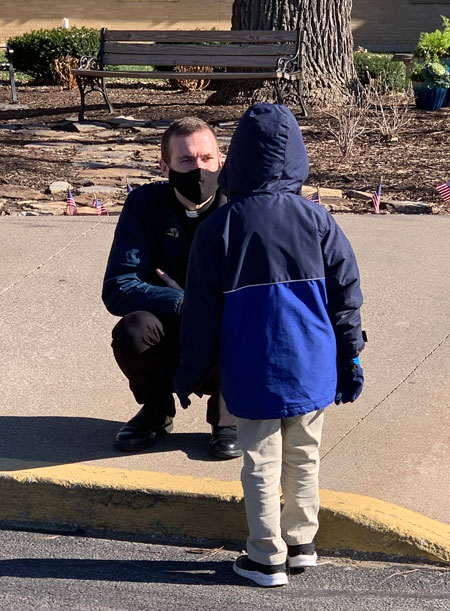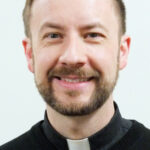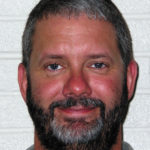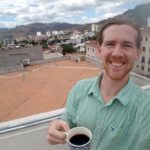By Anne Marie Amacher
The Catholic Messenger
BETTENDORF — Two months into his first official parish assignment, Father John Lamansky said he enjoys ministry at Our Lady of Lourdes Parish, despite the complications of a pandemic. He arrived at the parish in mid-October after finishing studies at the Pontifical North American College (NAC) in Rome, delayed by the pandemic.
Father Lamansky earned his STB degree “which is roughly equivalent to a master’s degree in theology.” He specialized in Biblical Theology, beginning in his last year of seminary at the NAC and resuming after his ordination to the priesthood in 2018.

Father John Lamansky, parochial vicar of Our Lady of Lourdes Parish in Bettendorf, visits with second-grader Owen Wermes during recess at Lourdes Catholic School.
“Because my first assignment as a priest was to continue studies that were going to resume in the fall, I spent the summer after priestly ordination serving as a ‘supply priest,’ meaning I temporarily served at various parishes across the diocese so that the pastors of those parishes could take some vacation time.”
After returning to Rome, in the midst of his studies, the pandemic struck Italy in early March. He and approximately 70 other priests had to remain in their residence building because Italy forbade people to leave their homes except for reasons of strict necessity.
“The original plan was for us student-priests to ‘weather it out,’ but eventually the decision was made to send us all home to the U.S. Because of the extent to which the country of Italy was shut down, it was impossible to ship back our possessions at that time, so I had to leave everything there.”
He returned to Rome in August, at which time pandemic restrictions had been relaxed significantly. “People were permitted to leave their houses. Churches, restaurants and even movie theaters were open. Providentially, my return to Rome was perfectly situated between the first and second waves of the virus. The second wave started just weeks after I finished up, at which point the restrictions started to tighten up significantly again.”
Father Lamansky said he made good use of the library there to prepare for the final comprehensive exam. “In addition to being able to show competency in biblical languages, I had to be prepared for the examiners to quiz me on anything drawn from thousands of pages of material. Normally this would take three or four months of full-time preparation, but I had to cram the work into a month and a half due to all the time that had been lost on account of the pandemic. Thankfully, I did very well on the final exam, and I wrapped up my affairs in Rome in early October.”
When he returned to the U.S. in October, the U.S. government no longer requested a two-week quarantine for arrivals from the European Union, he noted. “The point of a travel quarantine is to prevent people from bringing the virus into the destination country, but by then, the U.S. had one of the worst COVID case rates in the world, so importing it from elsewhere was no longer a concern. At that point, the risk of contracting the virus in the U.S. was far greater than the risk of contracting it in Italy.”
In mid-October, Father Lamansky began his assignment at Lourdes. “One of the very reasonable pandemic-era changes we made at Our Lady of Lourdes was foregoing the custom of having the priest shaking hands and greeting people at the end of weekend Masses. Because this means I normally only see parishioners from a distance while celebrating the liturgy, I haven’t gotten to personally meet as many as I would like. However, it’s not a question of ‘if,’ but ‘when.’ I’ll get to meet more people once the pandemic situation improves.”
“I am thoroughly enjoying parish ministry. Our Lady of Lourdes is a vibrant and welcoming parish, and I am very grateful for this assignment.” He has discovered there is a lot to do and learn all at once. “My favorite part of parish ministry so far has been getting to offer the sacrament of reconciliation.”
Navigating the challenges of the pandemic has been a challenge for everyone, “a time of detachment, of letting go of conveniences, customs and routines and, for some people, far more than that.” Such detachment can open up a void, he said. “We can let ourselves become depressed or we can take the opportunity to ask God to fill that void with his love and peace. To give just one example: the fact that we have to forego many of our activities means that we have more time at home, and we can use that time to cultivate habits of prayer for which we may not have made time in the past. Every challenge can also be an opportunity, so let’s make the most of it!”











